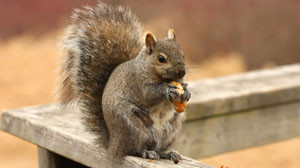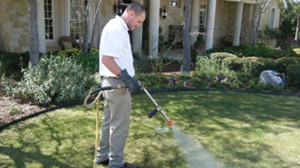In the colder seasons, people regularly find ants, rodents and other pests in their AC units. These pests find their way into homes in search of warmth, food and shelter. These incidents often result in damage to your HVAC system, so it’s important to know which pests you might encounter and how to keep them at bay.
Common Pests in AC Systems
Rodents
 Rodents such as mice, rats, opossums, raccoons, and squirrels are talented HVAC destroyers. These critters can chew through almost anything, and smaller rodents can squeeze through surprisingly small spaces. They will often nest in your home’s walls or attic and use the ductwork to move from place to place. Bigger rodents are especially likely to damage the connections in your air ducts. As they move around, they can make holes in the ductwork where air can escape and add a pretty penny to your energy bill.
Rodents such as mice, rats, opossums, raccoons, and squirrels are talented HVAC destroyers. These critters can chew through almost anything, and smaller rodents can squeeze through surprisingly small spaces. They will often nest in your home’s walls or attic and use the ductwork to move from place to place. Bigger rodents are especially likely to damage the connections in your air ducts. As they move around, they can make holes in the ductwork where air can escape and add a pretty penny to your energy bill.
Rodents are the most likely out of all pests to destroy insulation and electrical wiring, which is not just damaging but also dangerous. Rats and mice particularly love to chew up insulation to use for their nests. Moreover, they often chew on wires which can cause electrical fires.
Even if the physical damage to your home is minimal, rodents pose major health risks to humans and pets. Droppings, urine and the dander rodents leave behind can contaminate the air and exacerbate respiratory problems. Even worse, a rodent that has died in your air ducts will leave a foul smell that can take weeks to dissipate.
Ants
It’s never too early to plan ahead for spring. One of the most common pest problems Ben Hubbert, owner of San Antonio AC company, Champion AC, sees is crazy ants.
“In the spring when it rains, ants pool up near a condenser and they’re attracted to the acidity in a contractor,” Hubbert said.
When these ants come in contact with the contactor, they electrocute themselves and release an alarm pheromone. This alarm pheromone signals other ants to swarm and clog the unit until it short-circuits.
If your AC short-circuits, you’ll need to make a replacement. However, if you catch the problem early, a pest control service can treat the problem in various ways depending on your HVAC setup.
Wasps
Unprotected or damaged vents and ductwork are the perfect places for wasps to build hives because it shields them from the elements. Unfortunately for you, it’s tricky to eradicate wasp problems once they’ve moved in.
Wasps are known to build nests in the spring. If wasps have established a colony in your air conditioner, they also can get into your home. In the fall, when wasps are most active and looking for a place to hibernate, this poses a significant risk to family members and pets – especially for those with allergies.
Removing wasp nests is a delicate process that can lead to serious injury without proper training. You should always consult a professional when removing wasps from your home.
Snakes
Snakes are less likely to nest in your AC unit compared to other pests, but it is always possible. Like any other cold-blooded animal, they seek warm places to stay in the fall and winter months. If a snake can squeeze through small cracks and openings in your home’s ventilation system, they may nest and breed there.
A more frequent issue with snakes is when they coil up in your AC’s condenser. Once winter passes and you turn your air conditioner back on, snakes can get caught in the condenser fan’s blades and die. This is not only a problem for the snake but can also break your condenser fan.
Signs You’ve Got Company
The longer it takes you to notice a pest infestation, the higher your risk of costly HVAC damages. If you discover any of these issues, you should contact your local HVAC service. Here are some signs that there are animals in your AC:
- Foul smells
- Skittering, squeaking, or grinding sounds
- Animal droppings inside or near the outdoor unit
- Increased allergy symptoms
- Sudden loss or reduction of heating or cooling
How to Keep your AC Clear of Pests
When it comes to preventing pests, the best offense is a good defense. Take these measures to avoid housing unwanted guests in your air conditioning system and save on possible repairs.
Call a Pest Control Professional
When bugs get into your AC, it is NOT a good idea to spray pesticides in your vents or ducts. Doing so will allow the chemicals to contaminate the air and harm humans and pets. For the sake of your health, the safest thing to do when you need to remove bugs and animals in your HVAC system is to set traps or call a pest control service provider. A pest control company will be able to use non-toxic pesticides that get rid of the problem for good.
Seal Up Gaps in Ductwork
Ductwork damages happen when animals break through the seals in your duct connections. If you regularly check your ducts for damage and seal exposed areas, you’ll reduce the risk of pests getting inside and – bonus! – save money by preventing air leaks.
Cover Vents and Flues
Vents are a major highway between the outside and inside of your home. Installing pest-proof vent covers and screens will keep bugs, birds, rats and other varmints from joining the family.
Keep Your Outdoor Unit Tidy

Letting grass and weeds grow around your outdoor unit attracts pests. You can reduce your chance of infestation by practicing regular lawn care with mowing and weeding. You should also clean the unit if you see ants crawling inside in search for food. If it has been raining, be sure to remove excess moisture or puddling around the AC unit.
Ideally, your unit should sit on a slab above ground level and be at least two feet away from any vegetation. This will not only prevent animals from getting close to your AC but also keep grass, leaves and twigs from getting caught in the components.
Schedule Routine HVAC Maintenance
By and large, the most effective way to reduce pest problems is to conduct regular maintenance to your AC system.
Sometimes, animals will damage your unit despite your best efforts. Scheduling regular HVAC maintenance will help you make sure that any possible break-in points are sealed, components get cleaned of debris, and any problems that do arise are dealt with promptly. At the end of the day, this will keep your HVAC system working efficiently and give you peace of mind.




